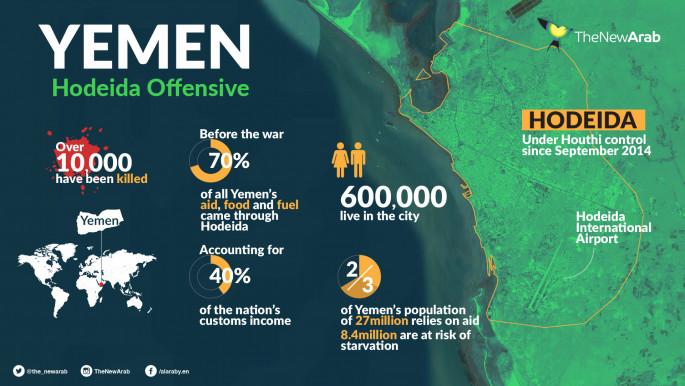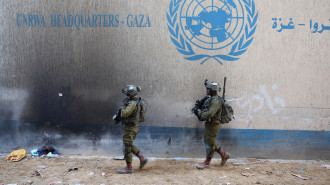'The situation is scary': Yemeni citizens in Hodeida suffer under coalition siege
'The situation is scary': Yemeni citizens in Hodeida suffer under coalition siege
Analysis: Yemeni civilians continue to bear the brunt of the war, as the conflicting sides 'gear up' for another violent outbreak in the city of Hodeida, writes Jonathan Fenton-Harvey.
5 min read
People who have been displaced from Hodeidah visit a displacement registration centre in Sanaa [Getty]
The Saudi Arabia and UAE-led operation to seize the Yemeni city of Hodeida has left its inhabitants facing dire circumstances, with life becoming unbearable for those who cannot leave, sources on the ground tell The New Arab.
After three years of war, the Saudi-led coalition and pro-regime forces had gained a foothold in the South-eastern part of Yemen, then setting its sights on Hodeida.
The city has around 600,000 inhabitants and a vital port which imports most of Yemen's goods. Securing the Houthi rebel-held city would give the coalition an upper hand in capturing the capital Sanaa.
The city has around 600,000 inhabitants and a vital port which imports most of Yemen's goods. Securing the Houthi rebel-held city would give the coalition an upper hand in capturing the capital Sanaa.
With diplomatic failures to secure a Houthi withdrawal from the city, including from the UN Envoy to Yemen Martin Griffiths, the coalition on June 13 pressed forward to capture the city – despite warning that an assault could worsen Yemen's humanitarian crisis.
Read also: Yemen: The fate of Hodeida
Read also: Yemen: The fate of Hodeida
Casualty statistics are unclear but reports suggest dozens have been killed.
On Thursday a Houthi artillery attack on Al-Jabali district in Western Hodeida killed at least seven civilians and wounded several others, said an anonymous Yemeni reporter.
On Thursday a Houthi artillery attack on Al-Jabali district in Western Hodeida killed at least seven civilians and wounded several others, said an anonymous Yemeni reporter.
While clashes have died down in the last week, seemingly to forge a diplomatic solution, the city is still under siege, and both sides are apparently gearing up for another violent outbreak. Civilians who are not killed or wounded still bear the brunt of the conflict.


Baseem, a Hodeida resident, told The New Arab of civilian casualties on the ground due to the fighting, which has been intense since the conflict broke out and strikes that have continued in recent days despite attempts to negotiate an end to the battle.
Most of the city is without electricity, with many civilians living in darkness, according to residents. The fighting has damaged several water pipelines, meaning people struggle to find clean water and cholera could spread further. Indiscriminate shelling has destroyed many people's properties.
Countless shops have closed, and other basic services like transportation are not fully functioning. Prices have recently soared further, often up to several hundred percent, with many Hodeida residents being unable to afford essential goods. Civilians try to carry out daily tasks but are severely restricted in their movement.
Most of the city is without electricity, with many civilians living in darkness, according to residents. The fighting has damaged several water pipelines, meaning people struggle to find clean water and cholera could spread further. Indiscriminate shelling has destroyed many people's properties.
Countless shops have closed, and other basic services like transportation are not fully functioning. Prices have recently soared further, often up to several hundred percent, with many Hodeida residents being unable to afford essential goods. Civilians try to carry out daily tasks but are severely restricted in their movement.
"The situation is still very scary. Many people have fled Hodeida, and we have reports of others taking refuge in local schools after being displaced," Jolien Veldwijk, Yemen's Deputy Country Director for CARE International, who operate in Yemen, told The New Arab.
"Some have been forced to open their houses to let snipers use their roofs as a base. One of the big hospitals in Hodeida was damaged by a missile."
"Some have been forced to open their houses to let snipers use their roofs as a base. One of the big hospitals in Hodeida was damaged by a missile."
 |
The situation is still very scary. Many people have fled Hodeida, and we have reports of others taking refuge in local schools after being displaced |  |
Several humanitarian NGOs including the Norwegian Refugee Council and CARE International say they have recently been forced to close their offices in Hodeida, which will prevent aid reaching civilians in the city. While aid groups are active on the city's, locals say they cannot reach the downtown areas.
Hodeida's hospitals are crippled from a lack of supplies, which could add to Yemen's already severe humanitarian crisis, which the UN has called the world's worst.
Read also: Saudi Arabia and UAE's dangerous rivalry over Yemen
Read also: Saudi Arabia and UAE's dangerous rivalry over Yemen
While many civilians have been able to flee, those who have no relatives or limited funds are stuck in an increasingly suffocating environment. The battle has made it harder for civilians to leave.
Ahmed, with his family of 19 members, fled to the Al-Qata'a area in the far eastern part of the city. They barely found drivers to take them out, but the drivers asked for a lot of money.
"We paid 20,000 Yemeni rials, around $42, for each passenger of us. That was a 300 percent increase from the usual prices," said Sami, Ahmed's son.
In Al-Qata'a area, they have rented a small house for the whole family, living in harsh conditions due to a lack of money.
 |
We paid 20,000 Yemeni rials, around $42, for each passenger of us. That was a 300 percent increase from the usual prices |  |
According to Sami, the city had begun to resemble a military complex by the time his family had left, with the Houthis preparing to counter a coalition assault. Countless buildings and the streets had been occupied by the rebels. Houthi snipers are often seen on rooftops.
"Hodeida city has turned into a large military position. Houthis have occupied all buildings and spaces and streets" Sami said.
Trenches in the downtown area and on the outskirts are full of landmines too, to prevent the advance of coalition troops.
CARE International have observed hundreds of civilians fleeing the city every day, to places like Hajja and Torba, and warn that numbers of refugees could increase as the war continues.
Veldwijk stressed that Hodeida has very limited supplies, and goods within it will not last more than two months if more supplies cannot enter.
"With the current fighting going on we are also very worried about how the goods get from the port to the people in need. The fighting must stop – we cannot wait until people starve, die of treatable diseases. This is the biggest humanitarian crisis of our times and all parties to this conflict need to immediately stop this war," said Veldwijk.
President Hadi on Wednesday met with Martin Griffiths, once again calling for the Houthis to withdraw from Hodeida to create a peaceful solution. The Houthis have reportedly shown signs of agreeing to hand the port over to UN supervision.
However, while diplomatic talks continue to stall, Yemenis lives will be put at further risk and the humanitarian crisis will worsen.
Jonathan Fenton-Harvey is a freelance journalist.
Follow him on Twitter: @jfentonharvey
Jonathan Fenton-Harvey is a freelance journalist.
Follow him on Twitter: @jfentonharvey

![Palestinians mourned the victims of an Israeli strike on Deir al-Balah [Getty]](/sites/default/files/styles/image_684x385/public/2024-11/GettyImages-2182362043.jpg?h=199d8c1f&itok=xSHZFbmc)


![The law could be enforced against teachers without prior notice [Getty]](/sites/default/files/styles/image_684x385/public/2178740715.jpeg?h=a5f2f23a&itok=hnqrCS4x)
 Follow the Middle East's top stories in English at The New Arab on Google News
Follow the Middle East's top stories in English at The New Arab on Google News


